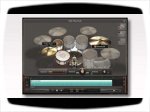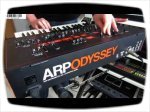Mac and Music News
Through Tuesday April 21, 2009
| Jul 29 - 12:07 PM | Plug-ins > Mathew Lane |
 Mathijs Indesteege aka Mathew Lane has announced the release of DrMS, a spacial processor plug-in which presents a new way to approach the manipulation of stereo audio.
Mathijs Indesteege aka Mathew Lane has announced the release of DrMS, a spacial processor plug-in which presents a new way to approach the manipulation of stereo audio.
Based on MS (Mid-Side) processing, DrMS splits the stereo signal into four sections rather than the normal two, giving you new levels of control: zoom in, add depth, change width or any combination and more. Each of the four sections has a resonant high pass filter to clean up the lows and a tilt equalizer to soften the highs, plus a sample-based delay line to slightly shift the signal against the other sections. The level and combination of the different sections will result in various changes of the stereo field.
The flexible controls ensure a wide range of applications, both for mixing and mastering as well as for post production. Use DrMS for tasks going from simple MS encoding/decoding, over stereo field and depth enhancement, to fixing mono compatibility issues and more.
For easy A/B comparison between original and processed signal, an autogain circuit is build in to ensure a level matched output.
DrMS is available now as AU/VST2/RTAS plug-in on Mac OSX and as VST2/RTAS plug-in on Windows for a fee of 25€ (ex. VAT). A demo version is also available.
| Jul 28 - 10:47 AM | Computer Hardware > Girton Labs |
 Imagine a control surface with real knobs, sliders, real switches for your favourite sequencer, plug-in, virtual synth or whatever. Let me introduce you to SenseSurface, a working demonstration prototype from Girton Labs.
Imagine a control surface with real knobs, sliders, real switches for your favourite sequencer, plug-in, virtual synth or whatever. Let me introduce you to SenseSurface, a working demonstration prototype from Girton Labs.
Applications that would normally use a mouse, Qwerty keyboard or MIDI controller can be now controlled with traditional knobs. The scroll bar on the right hand side of your computer screen can be controlled with a real slider button. SenseSurface can be used with most laptops with a USB input. The sensing knobs have a custom designed movement sensor to determine position within a range of 180 degrees with a 10 bit digital output, linearity typically 1%.
The magnetic knobs can be removed and repositioned immediately by picking them up and moving to a different part of screen. A unique sensing x/y matrix is attached to the rear of the laptop screen to detect the control's position. The distance of the sensor from the screen can also be detected.
The system is multitouch and scaleable , the number of controls on the screen is limited by the size of the screen. The screen can be at any angle. The SenseSurface should cost less than $100 in production.
Girton Labs is looking for interested business partners and manufacturers. For more information, please visit the link below :
| Jul 26 - 10:47 AM | Plug-ins > Tune It! |
 Tune It! is a piece of software that helps musicians to tune their instruments. It can also be used to monitor the pitch during live performance. It is based on an original and very accurate pitch detection algorithm. It can tune a wide range of instruments such as guitar, bass, piano, flute, violin, saxophone, etc.
Tune It! is a piece of software that helps musicians to tune their instruments. It can also be used to monitor the pitch during live performance. It is based on an original and very accurate pitch detection algorithm. It can tune a wide range of instruments such as guitar, bass, piano, flute, violin, saxophone, etc.
Available for both Mac and PC, it can be ran as a standalone application or as a plugin within a VST or AU host. The good news : Tune It! is totally free !
| Jul 25 - 01:38 PM | Computer Hardware > MXL |
 MXL (a division of Marshall Electronics) is pleased to announce the introduction of the MXL Studio 1 portable USB condenser microphone for the home recording market. The Studio 1 is the latest addition to the line of existing USB microphones from MXL.
MXL (a division of Marshall Electronics) is pleased to announce the introduction of the MXL Studio 1 portable USB condenser microphone for the home recording market. The Studio 1 is the latest addition to the line of existing USB microphones from MXL.
Unlike other products that require mixers, preamps, or expensive studio gear, USB condenser microphones are "Plug & Play". The MXL Studio 1 does not require any special drivers and is compatible with any PC or Mac computer.
The Studio 1 features a large two-micron diaphragm condenser capsule with a 40 Hz-20 kHz frequency response. The digital section features a 16-bit Delta Sigma A/D converter with available sampling rates of 44.1 kHz and 48 kHz. A red LED light behind the protective grill indicates that the microphone is active and correctly oriented toward the user. The Studio 1 also has an integrated headphone jack which provides zero latency monitoring and clear audio playback. This zero latency feature provides a more accurate recording when doing voiceovers and Internet recording such as podcasts, interviews, and personalized radio or playlists.
The MXL Studio 1 includes a hard black plastic carrying case, desktop microphone stand / adapter, 10-foot USB cable, user's manual, and application guide. The expected street price is $99.95 with a MSRP of $129.95.
| Jul 25 - 01:13 PM | Industry > Tascam |
 Tascam has announced that they are ceasing development of Gigastudio products, which includes the GVI engine. An official statement from the company states, "TEAC America, Inc. will cease further development of Gigastudio and Gigastudio related products as of July 21, 2008. Product sales and technical support will continue through the end of the year."
Tascam has announced that they are ceasing development of Gigastudio products, which includes the GVI engine. An official statement from the company states, "TEAC America, Inc. will cease further development of Gigastudio and Gigastudio related products as of July 21, 2008. Product sales and technical support will continue through the end of the year."
This comes as sour news not only for GigaStudio users (especially those who have recently purchased GigaStudio 4), but also to software developers who have licensed GigaStudio programs for their own products.
It sounds like Tascam is getting out of the software business completely. If you check their web site, the product category for software is completely empty, and everything Giga-related is now in the legacy software category.
In response, a petition to pass on the torch and make GigaStudio code open source has been started at OpenGigaStudio.com. To sign the petition you just have to leave a comment.











